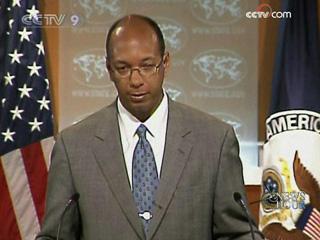Meanwhile, over in the US the Obama administration says it will participate directly in group talks with Iran over its suspect nuclear program.
It says the five permanent members of the UN Security Council and Germany will invite Iran to have a dialogue.

Washington's move is widely regarded as a policy shift from former President George W.Bush, whose administration had generally shunned such meetings.
State Department spokesman Robert Wood says the United States will now join others at the table -- from now on -- when senior diplomats from major powers meet with Iranian officials to discuss the nuclear issue.
Wood says the decision was conveyed to representatives of Britain, China, France and Russia as well as Germany, during a meeting in London on Wednesday.
That group, known as the"P5 plus 1", announced earlier that a new session would be aimed at breaking a deadlock in the talks.
Robert Wood, US State Department Spokesman, said, "The United States outlined the President's and the Secretary's goal on Iran which is to explore diplomatic solutions to the very serious areas of concern. The diplomatic solution necessitates a willingness to engage directly with each other on the basis of mutual respect and mutual interest. We hope that the government of Iran chooses to reciprocate."
Also on Wednesday, the six powers said in a statement that they would ask European Union foreign policy chief Javier Solana to invite Tehran to the talks. The goal will be to find "a diplomatic solution to this critical issue."
Analysts note that the US decision to join future group talks over Iran's nuclear program reverses the former Bush administration's policy of isolation.
They also say it will likely take time to overcome decades of mistrust. And they expect Iran to react with caution to the US decision particularly ahead of Iranian presidential election, in June.
(CCTV April 10, 2009)